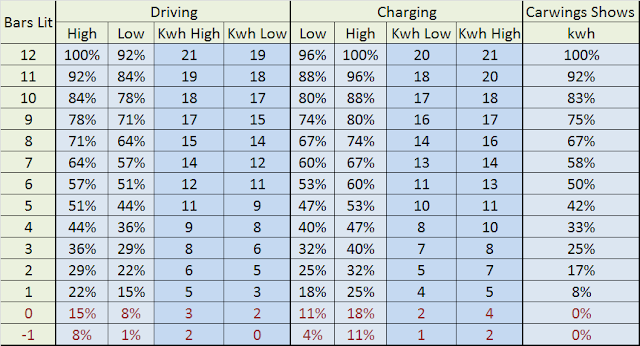evnow
Well-known member
Update : This SOC% corresponding to various bars in the Leaf dash is with the new firmware - based on this thread.

From various discussion in this thread, I've made a spread sheet that shows what lit bars showing available battery charge i.e. SOC (state of charge) really mean. When certain # is bars are lit, it doesn't mean a particualr SOC %, but a range. The range of SOC % that lit bars represent change depending on whether the car is being charged or being driven (i.e. discharged.)
Note : The below SOC% corresponding to various bars in the Leaf dash is with the old firmware.
The actual capacity shown is rounded up and assumes usable battery capacity of 24kwh. Carwings is an estimate - needs to be confirmed. Post here if you can confirm any of the carwings numbers.

The following images are from the user manual, thanks to AndyH.


12 - Driving Range Display
13 - Battery Available Charge Gauge (Fuel Gauge)
14 - Battery Capacity Level Gauge (Battery Condition/Total Capacity Gauge)

From various discussion in this thread, I've made a spread sheet that shows what lit bars showing available battery charge i.e. SOC (state of charge) really mean. When certain # is bars are lit, it doesn't mean a particualr SOC %, but a range. The range of SOC % that lit bars represent change depending on whether the car is being charged or being driven (i.e. discharged.)
Note : The below SOC% corresponding to various bars in the Leaf dash is with the old firmware.
The actual capacity shown is rounded up and assumes usable battery capacity of 24kwh. Carwings is an estimate - needs to be confirmed. Post here if you can confirm any of the carwings numbers.

The following images are from the user manual, thanks to AndyH.


12 - Driving Range Display
13 - Battery Available Charge Gauge (Fuel Gauge)
14 - Battery Capacity Level Gauge (Battery Condition/Total Capacity Gauge)



